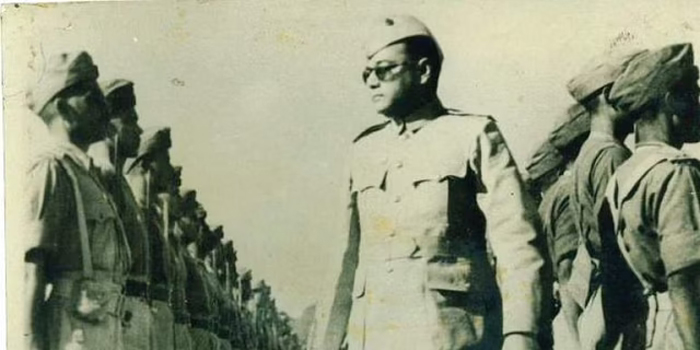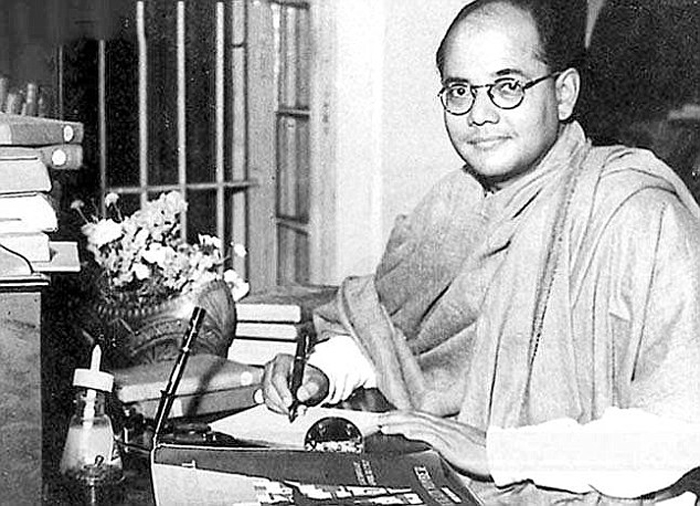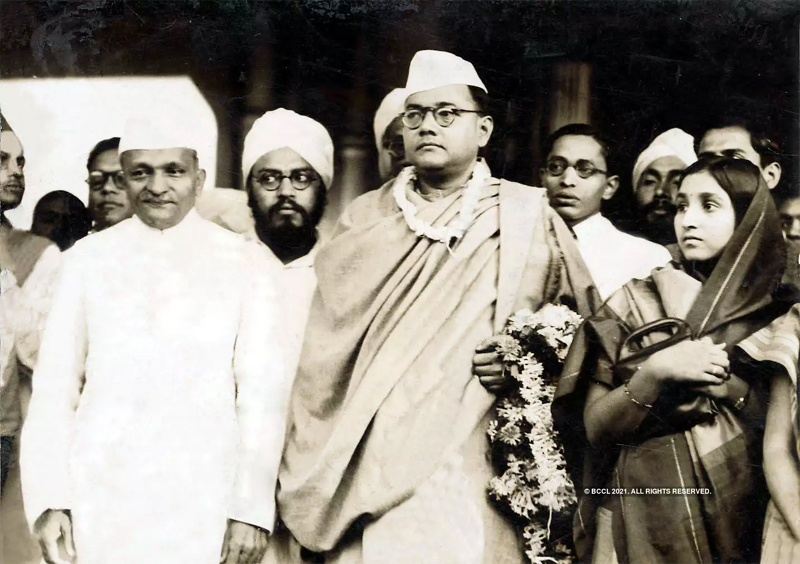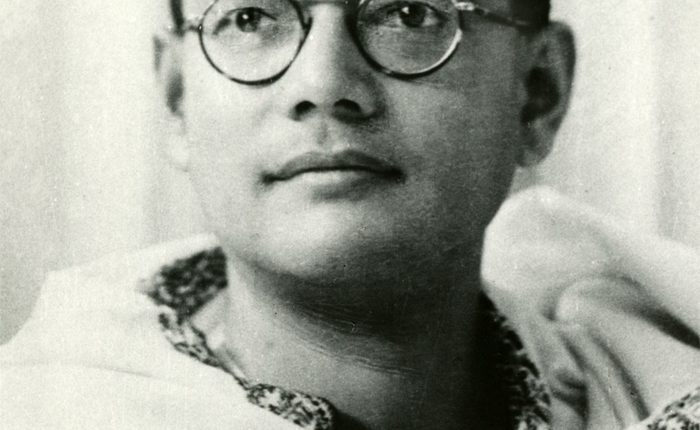Shri. Chandra Kumar Bose
“Netaji Subhas Chandra Bose was last seen in action on 18 August 1945, long before I was born. My father Amiya Nath Bose was very close to his uncle Netaji and shared the same bedroom with him from 1928- 1934, apart from those years when Netaji was in prison or overseas, on the second floor of our 1 Woodburn Park house. Netaji used to suffer from insomnia. In those days sleeping pills were not very popular or at least were not well known. Netaji used to come home very late, at about 12.30 or even 1 o’ clock in the morning. He would have a bath and would then eat whatever food was kept on the table in the room. He would then wake up my father and have discussions on many issues – about Gandhi, Nehru, Patel and many others. In 1928 the Congress Session was held in Calcutta with a uniformed Volunteer Corps organized for the occasion, and with my greatuncle as the General Officer Commanding. I heard from my father that as Subhas Bose was coming down the stairs from the second floor to the first floor, Subhas’s father Janaki Nath Bose came out of his room (he was on the first floor) and said something which my father thought was rather prophetic- Subhas, I hope you will be the Garibaldi of India.
I did not have the good fortune of knowing my grandfather Sarat Chandra Bose as he passed away before I was born on 20 February 1950. My knowledge both on Sarat Chandra Bose and Subhas Chandra Bose was gathered from my father, who would tell me of the various political, social and economic thoughts of these two great men. The one quality that I hope I have imbibed from Subhas is never to change course and never to compromise. Once your goals are set, no matter what, you have to achieve those goals.
Netaji Subhas Chandra Bose wanted a United Free India. Both Sarat Chandra Bose and Subhas Chandra Bose were vehemently against the partition of the country. They believed India had to fight for freedom and freedom could not be achieved by negotiation. Subhas Bose had said that ‘ In order to inspire our countrymen with fresh vigour, we have to place before them the new and integral image of freedom. During all these years we have meant and explained by freedom political freedom alone; but henceforth we have to declare that we do not want to liberate people merely from political bondage- we want to liberate them from all forms of bondage. The struggle for independence had as its aim the removal of the triple bondage of political, economic and social oppression. When all shackles are removed, we can proceed to build a new society on the basis of Samyavad. This principal aim of our freedom struggle is to build a free and classless society. This ideal and this dream have inspired men in all ages and in all lands.’ Unfortunately, we are a far cry away in realising this dream.

India faces today the greatest crisis in her history. Since independence, communal, regional and sectarian tendencies have been encouraged by different political parties in India, which today threaten the very existence of our nation. In the economic field there has been a greater concentration of economic power and wealth in fewer hands. The country is seething with discontent because of unsatisfactory levels of economic growth and growing economic disparities. The time has come to follow Netaji’s ideology and principles in order to establish India as one of the advanced and progressive nations of the World. The first principle of Netaji is, of course, undiluted and militant nationalism. To quote from Swami Vivekananda, ‘The first Gods we have to worship are our own countrymen.The second principle of Netaji is socialism, in a form which has its origin in the thought and culture of India. In the course of his speech at the Rangpur Political Conference on March 30, 1929 Netaji said : It was Swami Vivekananda who gave a new turn to the history of Bengal. As he repeatedly said, man-making was his mission in life. In the work of man-making, Swami Vivekananda did not confine his attention to any particular sect but embraced the whole of society.’ This socialism did not derive its birth from the books of Karl Marx. It has its origin in the thought and culture of India’… ‘New ideas of socialism are nowadays traveling to India from the West, and they are revolutionising the thoughts of many, but the idea of socialism is not a novelty in this country. We regard it as such only because we have lost the thread of our own history. It is not proper to take any school of thought as unmistakable and absolute truth. We must not forget that the Russians, the main disciples of Karl Marx, have not blindly followed his ideas’…
‘We have therefore to shape society and politics according to our own ideals and according to our needs. This should be the aim of every Indian.’
‘What we in India would like to have is a progressive system which will fulfill the social needs of the whole people and will be based on national sentiment. In other words, it will be a synthesis of Nationalism and Socialism.’
In 1931 Netaji said ’I have no doubt in my mind that the salvation of India as of the World, depends on socialism. India should learn from and profit by the experience of other nations- but India should be able to evolve her own methods in keeping with her own environment. In applying any theory to practice, you can never rule out geography or history. If you attempt it, you are bound to fail. India should therefore evolve her own form of socialism.’
In November, 1944, when Netaji was leading India’s last War of Liberation he said ‘ We want to build up a new and modern nation on the basis of our old culture and civilisation. For that we need modern industries, a modern army and all those things necessary to preserve our existence and our freedom under modern conditions…’
In the modern world, independence and security of a nation cannot be assured unless she becomes militarily a strong nation. The third principle of Netaji, therefore, requires the development of militarism in India. Netaji symbolises the spirit of warriors like Arjuna and Maharana Pratap. India surely needs such warriors now for her independence and security.
Mahatma Gandhi and Netaji both fought for Indian independence, though their strategies were different in one essential way. Gandhiji believed in a non-violent struggle and he was able to mobilise the masses for supporting this movement. This was Gandhiji’s achievement. According to Netaji this movement had serious limitations. Netaji recognized that the mighty British Empire could not be shaken purely by a non-violent movement. He believed that an armed revolution and struggle were essential to drive out the British from India. Gandhiji, Pandit Nehru, Sardar Patel and other Congress leaders of that time thought freedom could be achieved through negotiation with the British. They also failed to anticipate the problems that partition of the country would unleash. The evil effects of partition can be felt both in India and Pakistan even today. Netaji was of the opinion that without an armed struggle India would not remain united and would not achieve absolute freedom. Freedom has to be won through a struggle. Netaji was a pragmatist and not an extremist. Netaji’s approach was the only path for keeping India united.

Netaji was a freedom fighter, a national leader, a statesman, a political thinker and a beacon of freedom across Asia. Netaji is the only leader whose birthday is celebrated across the country spontaneously by the people. Government sponsorship is not required to celebrate the birthday of this patriot of patriots. It is unfortunate that even today adequate literature is not available to students who wish to understand Netaji’s thoughts and ideas. Research scholars have a responsibility to publish an accurate and full history of Netaji´s life and work. We have seen many a distortion in text books taught in schools and colleges. The time has come to rectify this, otherwise the true history of our freedom struggle will never be known.
The leaders of our nation today have little or no commitment towards our society. Public life is seen as just another profession. Netaji would not have led the country to its present situation had he been alive today. He was a disciplinarian and believed in equal opportunity for all. He stood for communal harmony which he demonstrated in the Indian National Army- where there were Hindus, Muslims, Sikhs, Christians and others who ate together, slept together and fought together. Women had equal status in the INA and fought next to their fellow men. The nation’s interest came first to Netaji above everything else.
If Netaji would have returned to India, perhaps India would have remained united under his leadership and probably won her independence much earlier.
There has been a concerted effort on the part of successive Congress governments and a few others with vested interests to distort the history of our freedom struggle, especially, concerning Netaji Subhas Chandra Bose. It is the responsibility of historians and scholars to ensure that history is written the way it actually happened. It is the responsibility of every citizen of this country to see to it that the true stories of dedication, courage and sacrifice of Netaji Subhas Chandra Bose and other national heroes are told and written for our future generations.
Netaji’s focus was like Arjuna. When Arjuna was asked to pierce the eye of the fish which was rotating on top of a rod by seeing the reflection in the water to win over Draupadi on behalf of the Pancha Pandavas, he was asked what he was looking at in the water: are you looking at the fish? Arjuna replied- no I am not looking at the fish! Again he was asked are you looking at the eye of the fish? Arjuna said no. Then finally he was asked what are you looking at? Arjuna replied- I am looking at the cornea of the eye of the fish which I am going to pierce with my bow and arrow and I am not looking at anything else. Netaji had this depth of focus and commitment to free India from the clutches of British Imperialism.
Netaji Bhavan in Kolkata was dedicated to the nation by Sarat Chandra Bose in 1946 to propagate the vision and message of Netaji. My father Amiya Nath Bose who took over the mantle from his father Sarat Bose in 1950, was the principle architect of the Netaji archives and museum which were established in Netaji Bhawan. He collected documents, photos, films etc from the archives and also individuals of various countries including Japan, Germany, Italy, the United Kingdom and placed all his valuable collections in Netaji Bhawan. Netaji Bhawan was meant to be a research institute for students and scholars interested in the life and work of both Netaji and Sarat Chandra Bose as well as the in the history of the anti-colonial movement in Asia. Unfortunately, the present administration at Netaji Bhawan does not give access to students and scholars who do not subscribe to their views.

It is now 75 years since India achieved independence and 72 years since India become a Republic and its constitution came into force. Today India is considered as one of the rising superpowers in Asia, closely following China. In recent years it has had impressive economic growth. Its information technology and communication sectors have seen phenomenal expansion. The Indian Armed Forces are now claimed to rank third in the world. India has acquired nuclear capability. Such military achievements as well as the cultural and artistic splendour of India, will be exhibited with great pride through parades and floats on Raj Path in the capital and in the main thoroughfares of other cities on 26th January. In Kolkata, when the grand parade will proceed through Red Road (renamed Indira Gandhi Sarani), the impressive statue of one man will be towering over the celebrations- that of Netaji Subhas Chandra Bose. It will be his 125th birth anniversary on 23 January 2022. There is a proposal before the Central Government to declare Netaji’s birthday as National Deshaprem Divas. Today, while celebrating our achievements in many fields, we need to pause to consider the crisis in our society- the malaise which manifests itself in rampant corruption including at very high levels, the desperation which compels our farmers to commit suicide in significant numbers,the politically motivated murders of ordinary people, the inhumanity which we see perpetrated by some of those who are there to protect us.
Indeed in India, as across the globe, we lament the absence of true leadership. Societies, including our own, are being torn by conflicts arising from religious, ethnic and tribal differences. The pursuit of self-interest reigns supreme at the cost of the common good. During a turbulent period of Indian history, Subhas Chandra Bose was able, by his own example, to inspire men and women to rise above their petty differences and fight together for freedom. As a young teenager he had written to his mother:’ … Mother, I wonder if Mother India in this age has one single selfless son- is our motherland really so unfortunate?… Will the condition of our country continue to go from bad to worse- will not any son of Mother India in distress, in total disregard of his selfish interests, dedicate his whole life to the cause of the Mother?.. A life in the service of others is the only one worth living..’
This is the message I would like to give to our younger generation.
What made Subhas Bose stand apart as a leader? It was his refusal to use religious symbols for political purposes which can explain his appeal across all communities. We should re-dedicate ourselves to working towards a society that Netaji had envisaged- a society which is not only free from political, but also social and economic bondage. In doing this, we may recall the words of Netaji:
There must be the identification of one’s life with the mainstream of India’s history. The realm of national life and of individual life must be merged completely. Any suffering of any nationality in India must be felt as one’s own suffering, any glory as one’s own glory.. All those who have accepted India as their motherland or all those who have made India their permanent home, are my brothers..’ ( 1926 Mandalay Jail, translated from the original Bengali; cited by Amiya Nath Bose).

The author Shri. Chandra Kumar Bose is the grand nephew of Netaji and this piece has been edited by Shri. Suparno Satpathy , the Chairman of Smt. Nandini Satpathy Memorial Trust – (SNSMT)
NB: The Article is the sole view of the author: It’s not an endorsement by the News Portal www. kalingavoice.com

